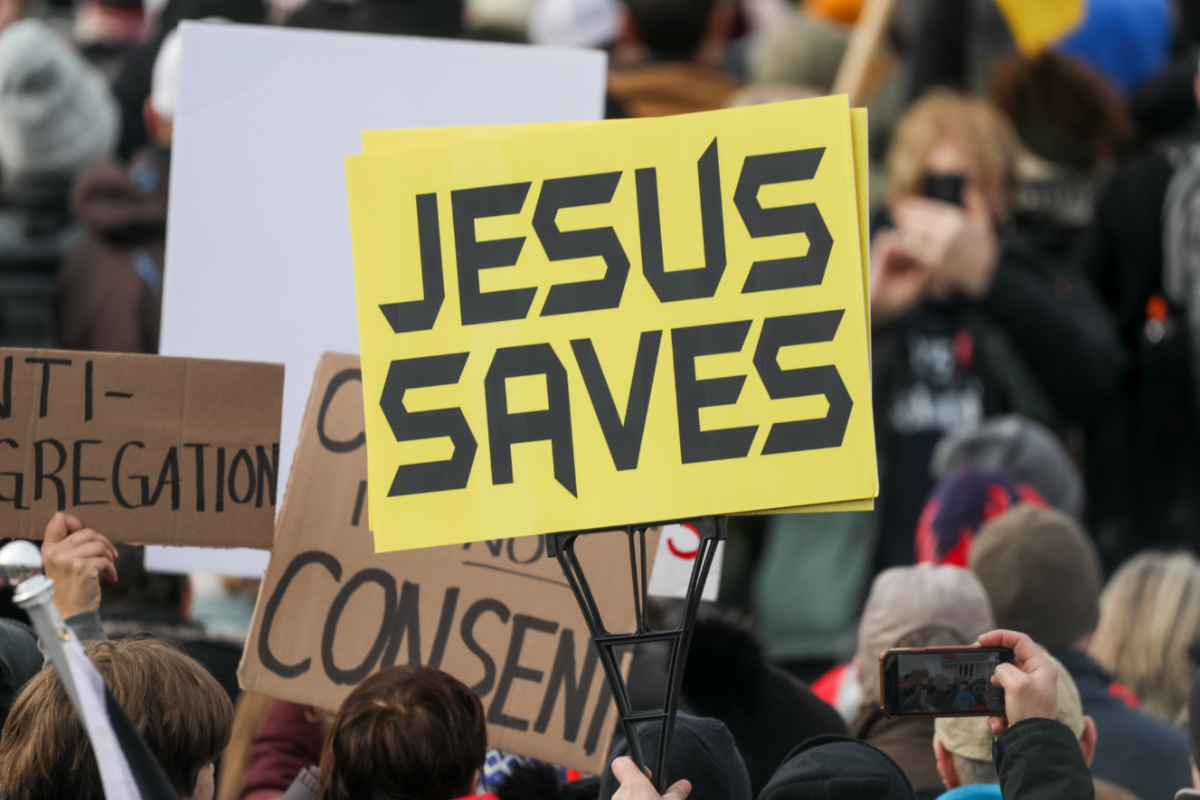
In an article first published on The Conversation, TAMAS LESTAR, of the University of Winchester, looks at the “strong correlation” between spirituality and COVID-19 vaccine hesitancy…
In the two-and-a-half years since the first COVID vaccines were administered, anti-vaccination sentiment has grown exponentially. Scepticism about vaccines has been voiced, in particular, in religious communities across the world, from South Korea and New Zealand to South Africa, the UK and prominently among white evangelicals, in the US.
In my own church, people have expressed disbelief and denial. Some have claimed the pandemic is a lie and that the solutions proffered are proof of governmental population control and the formation of a “new world order”.

Thousands of people gather at the Lincoln Memorial to protest vaccine mandates in Washington DC, on 23rd January, 2022. PICTURE: Nicole Glass Photography/Shutterstock.
This clearly isn’t the case for all religious people. But research confirms there is a strong correlation between spirituality and COVID-19 vaccine hesitancy, scepticism, and outright rejection. Among some religious and spiritual groups, the scepticism about vaccination is rooted in low faith in science. Among others, it overlaps with wider conspiracy theories.
Low faith in science
Between late 2020 and the summer of 2021, psychologists conducted a series of studies online in the UK. In the first two studies they surveyed 296 and 289 participants respectively, almost all of whom (456) then took part in a follow-up study.
“This research found that people who were more spiritual were more hesitant or indecisive about getting the COVID vaccine. The researchers identified low science literacy and, particularly, low faith in science as causes.”
This research found that people who were more spiritual were more hesitant or indecisive about getting the COVID vaccine. The researchers identified low science literacy and, particularly, low faith in science as causes.
To explore these issues in a different religious and non-Western context, the authors of that research conducted a subsequent study in Greece. There too, they found a similar relationship between low faith in science and vaccine scepticism.
Another study conducted in the Netherlands found also a strong connection between contemporary, non-religious forms of spirituality and distrust in science. The distrust, however, was not applied to all aspects of science. Participants voiced little doubt about climate change. But they did strongly question the COVID vaccine.
In some instances, this spiritually informed scepticism of vaccine efficacy has been rooted not only in low faith in science but wider conspiracy theories.
In a 2011 paper entitled “The emergence of conspirituality” conspiracy theory experts Charlotte Ward and David Voas detailed what they described as a new, hybrid system of belief. They called it “conspirituality”, a word borrowed from a Canadian hip-hop group of that name, famous for their radical, politically conscious lyrics.
Ward and Voas defined conspirituality as marrying “the female-dominated New Age (with its positive focus on self) and the male-dominated realm of conspiracy theory (with its negative focus on global politics)”. They said: “Proponents believe that the best strategy for dealing with the threat of a totalitarian ‘new world order’ is to act in accordance with an awakened ‘new paradigm’ worldview.”
As far as the COVID-19 vaccine is concerned, conspiratorial anti-vax campaigners across the globe cite government, ‘big pharma’ companies and western medicine as the objects of their mistrust. They posit that the body and its immune system is sacred. They see the supposedly toxic materials they claim are in vaccines as posing an existential threat.
Disaster spirituality
In May, 2020, a journalist, a cult researcher and a yoga expert launched the Conspirituality Podcast, aiming to dissect where the wellness industry overlaps with new age cults and conspiracy theorists. Episodes have covered everything from QAnon to Robert F Kennedy Jr as the antivax candidate of US presidential campaigns.
They provide listeners, as one reviewer has noted, with updates on “disaster spirituality” and interviews with guests “who have either been part of, or are experts on, online cult-like communities where a desire to live more naturally has become a form of paranoia”.
Though people holding these conspiratorial views generally criticise scientific authority, they nonetheless cite supposedly “scientific” findings as supporting evidence for their claims.
They appeal for individual sovereignty and consciousness. They claim they are breaking away from mind control by the world’s elite. This dualistic outlook sets “us” (the entlightened) against “them” (the politicians and corporations).
We rely on our readers to fund Sight's work - become a financial supporter today!
For more information, head to our Subscriber's page.
Researchers at Deakin University in Australia have identified 12 characteristics of what they term the “(con)spirituality of religious extremism”, including COVID-19 vaccine hesitancy or refusal.
The researchers say (con)spiritualists, in common with adherents of many other religious extremist movements, uphold “exclusive religious and spiritual narratives which frame them as being exceptional and privy to the real, hidden, one and only truth and as more enlightened than mainstream society”. They bracketed the word (con) in order to underline the complexity of the issue.
They explain that some people within spiritual and wellness circles actually question modernity in legitimate and informed ways. Others, though, are out to con their followers, spreading disinformation that “poses significant risks to society, sometimes for financial gain”.
Spirituality is a complex, multi-faceted thing. And people are sceptical of science for all kinds of reasons, not only spiritual ones. But in order to adequately prepare for the next pandemic, we need to be able to address diverse opinions wisely. We need to understand where people’s spirituality and science scepticism overlap – and why.![]()
Tamas Lestar is a senior lecturer in responsible management & leadership at University of Winchester. This article is republished from The Conversation under a Creative Commons license. Read the original article.






